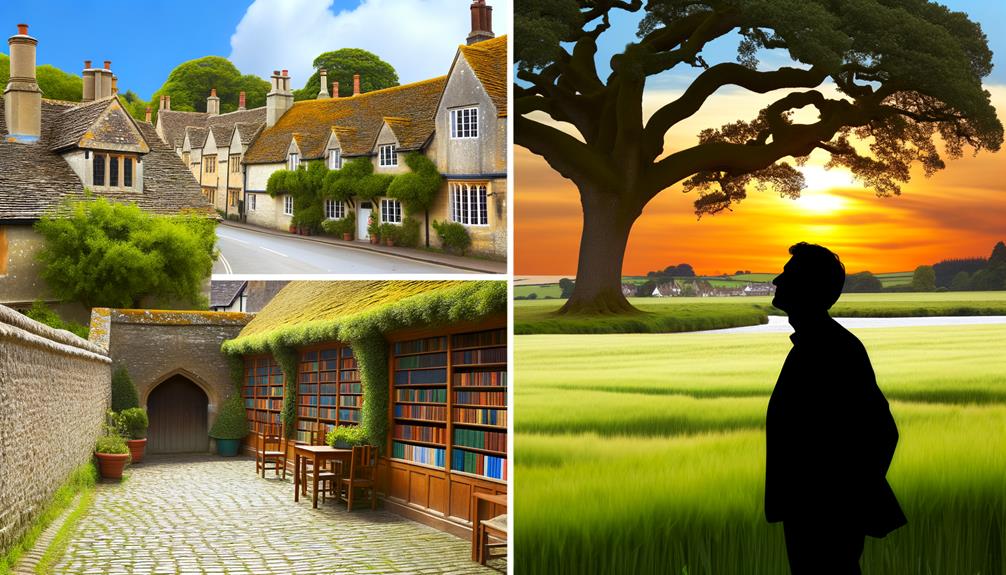Meaning of the Name Milton
The name Milton originates from Old English, combining 'middel' (middle) and 'tun' (enclosure or settlement) to denote a central settlement. This etymology reflects historical geographical and societal elements.
Milton has significant cultural bearings, linked to prominent figures like economist Milton Friedman and literary icon John Milton. While its popularity has waned in recent decades, it retains a classical charm.
The name also boasts a rich literary and intellectual heritage, influencing works from the Enlightenment to modern fantasy. If intrigued by its multifaceted legacy, further insights await.

Key Takeaways
- Milton means 'middle settlement' derived from Old English words 'middel' (middle) and 'tun' (enclosure or settlement).
- The name signifies a central village or farmstead within a region.
- It reflects historical and societal elements of early English settlement naming conventions.
- Milton is associated with notable individuals like economist Milton Friedman and chocolatier Milton Hershey.
- The name has traditional charm but has seen a decline in popularity over recent decades.
Etymology of Milton
The etymology of the name Milton can be traced back to Old English origins, where it is derived from the words 'middel,' meaning 'middle,' and 'tun,' meaning 'enclosure' or 'settlement.'
This linguistic composition suggests that Milton was initially used to describe a settlement centrally located within a particular region. The term 'tun' was commonly used in Old English to denote a village or farmstead, indicating a place of habitation.
As such, Milton likely referred to a community or homestead situated in a central or intermediary position. Understanding this etymological foundation provides clarity on how the name encapsulates geographical and societal elements of its time, reflecting the importance of location in historical settlement naming conventions.
Historical Significance
Throughout history, Milton has served as a name of considerable importance, often associated with notable figures and locations that have left a lasting impact on cultural and societal developments.
The name Milton is intrinsically linked to places in England, such as the village of Milton in Cambridgeshire, which contributed to the spread and preservation of the name. Additionally, the name has been embraced by various towns and cities worldwide, reflecting its enduring appeal.
The historical significance of Milton also extends to educational institutions and literary works, underscoring its influence across multiple domains. By examining these connections, one can appreciate how the name Milton has woven itself into the fabric of historical and cultural narratives, thereby sustaining its relevance through the ages.
Famous Bearers
Building upon its historical significance, the name Milton has been borne by numerous influential individuals whose contributions have spanned various fields, including literature, politics, and science. These bearers have left indelible marks on their respective domains, showcasing the name's widespread impact.
- Milton Friedman: A Nobel Prize-winning economist known for his influential theories on monetary policy and free-market capitalism.
- Milton Hershey: Founder of the Hershey Chocolate Company, revolutionizing the American confectionery industry.
- Milton Obote: Twice President of Uganda, playing a pivotal role in the country's post-independence political landscape.
- Milton Erickson: Renowned psychiatrist and psychotherapist, pioneering innovative techniques in medical hypnosis and psychotherapy.
These notable individuals exemplify the diverse and far-reaching influence of those who carry the name Milton.
Literary Connections
The name Milton carries significant literary weight, primarily due to the monumental influence of John Milton, whose works like 'Paradise Lost' have shaped English literature.
This legacy extends into modern literature, where the name Milton is frequently referenced or adopted, symbolizing intellectual rigor and poetic mastery.
Understanding these literary connections provides deeper insight into the cultural and historical resonance of the name.
John Milton's Influence
John Milton's profound influence on subsequent literary works is evident through the numerous allusions and stylistic imitations found in the writings of later poets and authors. His magnum opus, 'Paradise Lost,' has left an indelible mark on the literary landscape, inspiring a legacy of rich, complex narratives and epic poetry. Milton's innovative use of blank verse and his exploration of profound theological themes resonate across centuries.
- Echoes of Milton's grandiose diction: Later poets like William Wordsworth and Percy Bysshe Shelley employed similar elevated language.
- Paradise Lost's thematic depth: Works by authors such as Mary Shelley and Herman Melville reflect Miltonic exploration of good and evil.
- Milton's narrative scope: Epic storytelling found in modern fantasy literature.
- Revolutionary ideas: His political and philosophical views influenced Enlightenment thinkers and writers.
This enduring influence underscores Milton's monumental place in literary history.
Milton in Modern Literature
Frequently, modern literature exhibits echoes of Milton's thematic and stylistic innovations, underscoring his enduring influence on contemporary narratives and poetic forms.
Authors such as Philip Pullman in *His Dark Materials* draw on Milton's *Paradise Lost*, embedding complex explorations of free will, authority, and rebellion.
Similarly, T.S. Eliot's *The Waste Land* showcases Miltonic intertextuality, weaving in allusions that enrich its fragmented structure.
Moreover, Milton's grand style and intricate use of blank verse resonate in the works of modern poets like Derek Walcott, whose *Omeros* reflects a Miltonic ambition in its epic scope and cultural depth.
These instances illustrate how Milton's legacy endures, continuously shaping and inspiring modern literary landscapes.
Cultural Impact
Milton's name has permeated various cultural domains, influencing literature, geography, and personal naming conventions. Its cultural impact is evident in multiple facets of society:
- Literature: John Milton's seminal work, *Paradise Lost*, remains a cornerstone of English literature, influencing countless writers and scholars.
- Geography: Numerous towns and cities across the United States and the United Kingdom bear the name Milton, reflecting its historical and cultural significance.
- Personal Naming: The name has been adopted widely, reflecting admiration for its historical bearers and its enduring appeal.
- Media: Characters named Milton frequently appear in films, television shows, and books, symbolizing various themes from intellectualism to rebellion.
This widespread usage underscores Milton's enduring influence across different sectors.
Popularity Over Time
Examining the popularity of the name Milton reveals significant fluctuations over time. Historical name trends indicate that Milton reached its peak popularity in the early 20th century, particularly in English-speaking countries.
However, modern usage has seen a notable decline, reflecting broader shifts in naming conventions and cultural preferences.
Historical Name Trends
Tracing the historical popularity of the name Milton reveals significant fluctuations influenced by cultural, literary, and social factors. Analyzing these trends provides insight into how external influences shape naming conventions over time.
For instance, the name has experienced varying levels of prominence, often tied to notable figures or periods in history.
Key historical trends include:
- Literary Impact: The name saw a rise during times when works by John Milton, the famous poet, gained renewed attention.
- Cultural Shifts: Periods of traditionalism or romanticism often saw a resurgence in the name's popularity.
- Social Movements: Names like Milton sometimes gained favor during periods of social reform or civic-minded movements.
- Demographic Changes: Shifts in population dynamics and ethnic influences also played a role in the name's popularity.
Peak Popularity Periods
Analyzing the historical trends of the name Milton reveals distinct periods of peak popularity, often coinciding with significant cultural and societal developments. The name saw its highest usage in the early 20th century, particularly between the 1910s and 1930s. This surge can be attributed to the increased visibility of notable figures such as Milton S. Hershey, the American chocolatier, whose success and philanthropy left a lasting impact.
Additionally, the literary influence of John Milton, whose works were widely studied, contributed to the name's appeal. The name's popularity was further amplified during periods when traditional, Anglo-Saxon names were favored. These factors collectively underscore the cultural resonance and historical significance that propelled Milton to its peak popularity.
Modern Usage Decline
Despite its historical prominence, the name Milton has experienced a marked decline in modern usage, reflecting broader shifts in naming conventions and cultural preferences. This trend can be attributed to several factors:
- Generational Shifts: Younger parents often seek unique or contemporary names, distancing from older, traditional choices like Milton.
- Cultural Influences: Media and popular culture heavily influence naming trends, favoring names that resonate with current societal norms.
- Perceived Outdatedness: Names like Milton may be perceived as antiquated, losing appeal as newer, more fashionable names emerge.
- Competitive Naming Landscape: The diversification of names available today results in a diluted popularity for any single traditional name.
These elements collectively contribute to the observable decline of the name Milton in recent times.
Modern Usage
In contemporary society, the name Milton is often perceived as traditional and somewhat rare, reflecting its historical roots and literary significance. Its usage has declined over recent decades, yet it retains a unique charm for those who appreciate its classical connotations. Modern usage of the name Milton can be analyzed through various metrics, as shown in the table below:
| Metric | Description | Current Trend |
|---|---|---|
| Popularity Rank | National ranking among names | Decreasing |
| Cultural Presence | Appearances in media and books | Limited but notable |
| Demographic Trends | Age groups using the name | Older generations |
| Geographic Spread | Prevalence by region | Varies, more common in Western regions |
This analysis underscores Milton's enduring appeal, despite its rarity in modern naming conventions.
Conclusion
The name Milton, rooted in Old English and historically significant, has been borne by notable figures such as John Milton, the revered poet. Its literary connections and cultural impact are profound.
Surprisingly, the name saw a peak in popularity in the United States during the 1920s, ranking within the top 100 names for boys. Today, while less common, Milton retains a distinguished presence, reflecting its enduring legacy.
This historical persistence underscores its unique appeal across generations.






